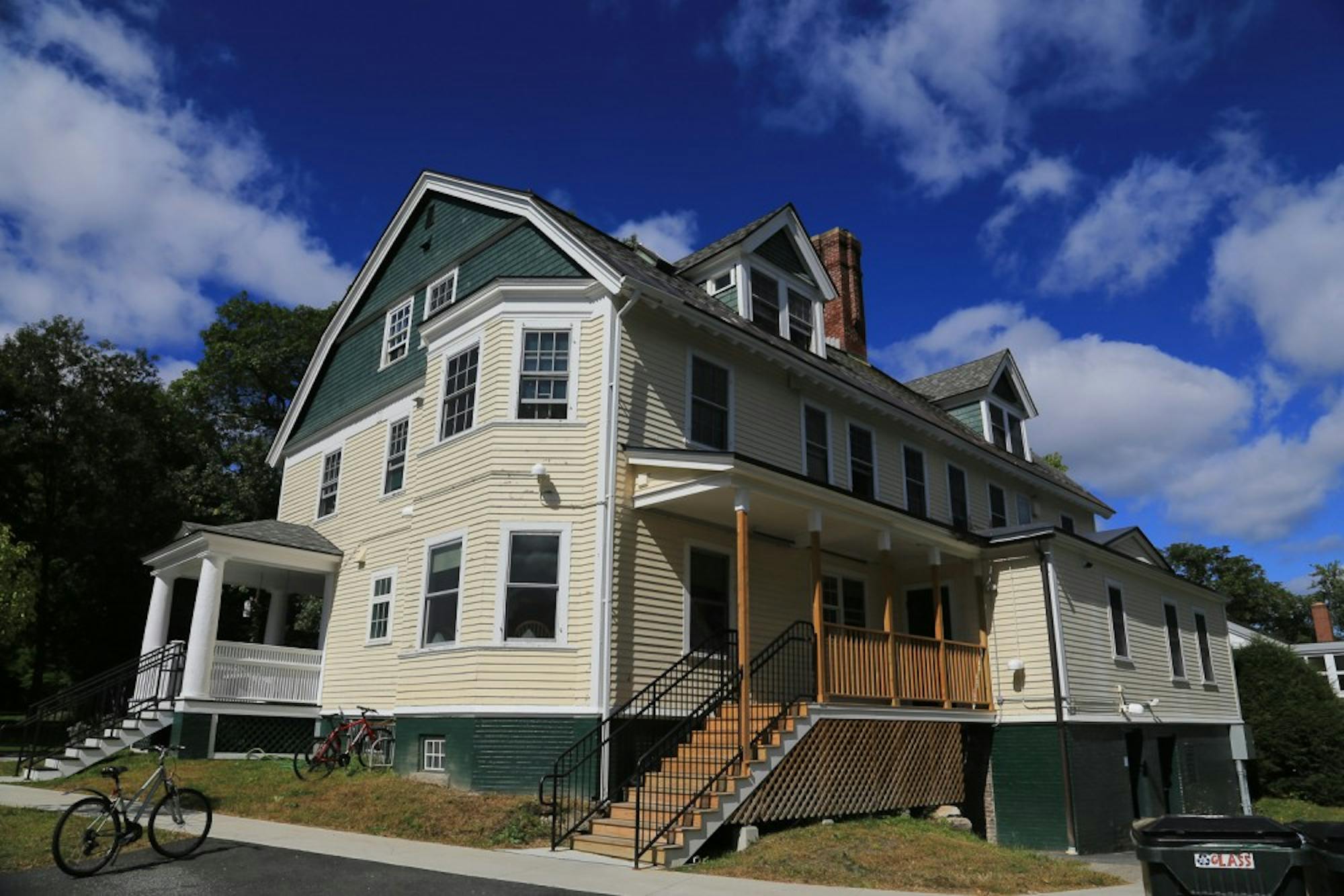Chi Delta sorority officially separated from Delta Delta Delta sorority, its national governing body, last week and came under the auspices of the College’s Greek life insurance policy on Monday, Chi Delt leaders said.
After announcing plans to localize last spring, Chi Delt began a lengthy and at times trying process to become a local sorority, Chi Delt president Lauren Buchanan ’16 said.
“This summer has been miserable,” she said. “We’ve had so many hoops to jump through.”
Chi Delt does not intend to open its basement to campus, social chair Reilly Johnson ’16 said. The decision was reached in part because of the house’s culture and partly due to spatial concerns, Buchanan and Johnson said.
“We’re pretty dedicated to the idea that we have a social space, but it’s people we want in our social space, not anyone who wants to be in our social space,” Buchanan said. “Although we will have events open to the entire campus, we’ll continue to be dedicated to the idea that it is our social space and you have to be invited into that space [to enter].”
Johnson emphasized the small size of Chi Delt’s basement compared to other local sororities like Kappa Delta Epsilon sorority and Sigma Delta sorority.
“I think that [Chi Delt’s] social scene isn’t going to change very much,” she said. “I don’t think we have the space necessary to become a very ‘rage-y’ sorority.”
Still, Chi Delt will attempt to host more open events. Buchanan said the house aims to create an event modeled on Alpha Chi Alpha fraternity’s Pigstick event that will instead be fall-themed. Such an event might be based on the German festival of Oktoberfest, Johnson said.
Chi Delt’s decision not to have an open basement may mean that the house’s localization will not lead to more female-dominated social spaces on campus, Panhellenic Council vice president for public relations Allison Chou ’17 said.
“Definitely in general it’s a step toward more autonomy for female organizations on campus,” she said. “I would definitely expect that to factor into our larger goal of hosting more co-sorority events and programming across the Panhellenic community.”
Chou said such multi-sorority programming will likely increase.
“Even though we’re not necessarily going to have an open basement, we’re committed to having events that are open to the whole campus,” Buchanan said.
Financially, the sorority is in a strong position, vice president for finance Lauren Martin ’16 said.
The house, which prides itself on having the lowest dues on campus, will incrementally lower its dues once again this term and may lower them again in the future, Martin said.
The dues will be reduced from $225 to $210 per term this fall, an incremental decrease, Martin said. Since the sorority no longer needs to send roughly two-thirds of its income from dues to its national organization each term, it has substantially more capital on hand for various programs, she said.
The sorority experienced challenges in its relations with both Dartmouth administrators and Delta Delta Delta’s national organization, she said.
After Chi Delt’s leadership informed its national of its intention to localize, they submitted a petition calling for the withdrawal of the national charter signed by more than two-thirds of the house’s membership, Buchanan said. Thereafter, representatives of Delta Delta Delta failed to inform Chi Delt’s leaders of their position or if their charter would be withdrawn for several months, she said.
Eventually, Chi Delt’s leaders were informed that representatives from Delta Delta Delta’s Arlington, Texas, headquarters and its Boston branch office would be announcing their decision in person, Buchanan said. The representatives – three from the Texas office and two from Boston, all of whom were flown in specifically for the occasion – came to the house, read a letter announcing the withdrawal of the charter and promptly left, she said.
The representatives of Delta Delta Delta were courteous in their dealings with Chi Delt, although they expressed disappointment in the sorority’s decision, Buchanan said. It is unusual for a sorority to disaffiliate from its national organization, and Buchanan believes that Chi Delt may have been the first house to ever take such a step in the Delta Delta Delta organization.
“We don’t believe in a lot of [Delta Delta Delta’s] principles and rituals that have a lot of religious undertones, and we think that as a chapter we should be a secular organization,” Buchanan said. “We don’t believe in the fact that we send tons of money to them every year, and we don’t really feel that we see the payback of that.”
Buchanan later clarified that she meant that the house sends over half of what it receives in dues to its former national.
Both Buchanan and Martin said the house faced difficulties in its dealings with the College.
“I think some promises were made that were never delivered upon,” Buchanan said.
Although she declined to comment further on which promises the College had failed to uphold, Buchanan praised the Office of Student Affairs and Student Assembly for their support.
In the spring, Dartmouth promised to compensate Chi Delt for the roughly $90,000 in holdings that Delta Delta Delta would seize if the chapter localized. Buchanan declined to comment on whether that commitment had been met.
“We have plenty of money, and we’ll continue to operate as we always do,” she said.
The sorority will also receive financial support from Panhell, Martin said. Panhell will compensate Chi Delt for most or all of its financial aid programs this year, and may also assist with smaller expenses like bid night shirts for new members following rush, she said.
Panhell’s financial support is meant as an “expression of not only verbal but tangible support,” Martin said.
Chou said she did not know exactly what form of financial support Panhell would offer, adding that Chi Delt will receive financial support first from the College, then from Panhell. It is not yet clear if Panhell will offer more financial support to Chi Delt than to other sororities, Chou said.
Chi Delt made other logistical decisions over a period of many months, Buchanan said. The name “Chi Delta” was selected from a variety of options, including some relating to the house’s chapter name, Gamma Gamma; its location, 3 Occom Ridge and other geographic and Greek letter symbols, she said.
“That was something we took a long time to deliberate and think about,” she said. “We talked about this for hours on end, and I think that Chi Delta was something that the rest of the school could still understand because it was pretty similar.”
New colors have not yet been selected, but new Chi Delt gear has been purchased, Buchanan said.
The house will also be repainted in the near future, she said.
Other houses may follow a similar trajectory to Chi Delt and elect to localize, Chou said.
“A couple of our houses have had house-wide discussions about the topic, but ultimately every house is different, every house has different financial situations, every house has different relationships with their national bodies, and ultimately I think that’s a very individualized decision,” Chou said.
Buchanan said some houses have expressed interest in learning more about Chi Delt’s localization process, but she declined to name which.
“I would encourage other sororities to do that, because now that we’ve done it, it will be a much easier process,” Buchanan said. “Across the board, Dartmouth chapters are very different from national Greek organizations.”




